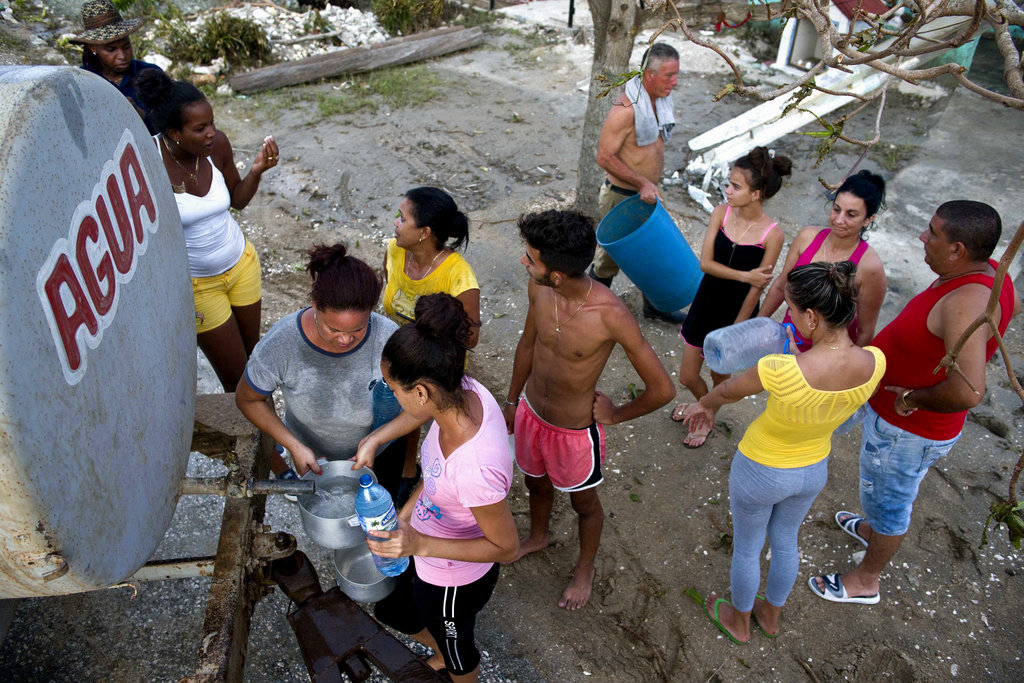PHILIPSBURG, St. Maarten — Dominga Tejera picked her way around fallen palm trees rotting in mud as she returned home after a nine-hour workday as a hospital janitor on a Caribbean island that until recently seemed like paradise.
She collapsed into a small plastic chair that has served as a makeshift bed since Hurricane Irma ripped the roof from her home as it pummeled St. Martin as a Category 5 storm.
“It’s sad when you come home to this,” she said as she began to cry. “You try to stay strong in public, but once inside, you break.”
Hundreds of people across an island shared by Dutch St. Maarten and French St. Martin are trying to rebuild the lives they had before the hurricane hit, celebrating little things like a rare evening breeze that clears the stifling air amid a widespread power outage and laughing as a radio announcer cheerfully announces, “The dentist is open!”
But many like Tejera are struggling to maintain a semblance of the normality they had before Irma.
“There’s no food here. There’s no water here,” said 70-year-old Germania Perez.
Adding to the stress of lack of food and shelter were reports of widespread looting by armed gangs.
As night falls, residents hurry inside, fearful of robbers roaming the streets and of the handful of men walking around with sunglasses and yanking chains tied to aggressive dogs.
“We can’t sleep in peace because of the thieves,” said Yovanny Roque, a 48-year-old mover.
The Public Prosecutor’s office in Dutch St. Maarten said in a statement Tuesday that police and soldiers there have put an end to the looting and robberies.
Authorities have photos and videos of suspects involved be working with the public to identify them, they said. However, the government only has enough space to detain only those accused of the most serious offenses.
Help was making it to the island, from the Dutch and French governments, other nations and private organizations. A French military ship with supplies was due to arrive Tuesday, coinciding with a visit by French President Emmanuel Macron, who arrived Tuesday in Guadeloupe, the first step of his visit to French Caribbean islands.
Hundreds of tourists are still trying to leave the island, with dozens lining up outside the Princess Juliana Airport, where only five large letters of its name remains.
One unidentified passenger abandoned a Yorkshire terrier named Oliver, tied to a barricade with airport security tape, as some people were told they could not bring pets. The tiny dog was later rescued by a local resident who took pity on him.
As foreigners rushed to leave the island, locals struggled to find basic amenities.
“We need water and food. It’s not a ‘maybe.’ It’s a ‘for sure,'” said Phillip King, a 53-year-old tour bus driver. “My job is done right now. It’s gone for a long time.”
Dalaney Kertzious, a 44-year-old port security officer, spent the hurricane at a hotel that evacuated its guests after the storm blew out windows. She found another hotel but has to leave with her 17-year-old daughter by Tuesday and does not want to stay in their home because it has no roof.
“I will try my best, but I have nowhere to spend the night,” she said, adding that the homes of her family and friends are already full.
Across the island, cars lie tossed upside down, at 90-degree angles and on top of other cars. Large boats lean sideways on dry land.
At least 35 people have been killed by Irma in the Caribbean, 10 of which were in Cuba. That is Cuba’s worst hurricane death toll since 16 died in Hurricane Dennis in 2005. Macron said Tuesday 11 people were killed on the French side of St. Martin.
Havana was in recovery mode Monday, with crews cleaning away thousands of fallen trees and electric restored to a handful of neighborhoods. Schools were closed until further notice. President Raul Castro issued a message to the nation that didn’t mention the deaths, but described damage to “housing, the electrical system and agriculture.”
To the east, in the Leeward Islands known as the playground for the rich and famous, governments came under criticism for failing to respond quickly to the hurricane, which flattened many towns and turned lush, green hills to brown stubble.
Residents have reported food, water and medicine shortages, as well as looting.
British Foreign Secretary Boris Johnson defended his government’s response to what he called an “unprecedented catastrophe” and promised to increase funding for the relief effort. Britain sent a navy ship and almost 500 troops to the British Virgin Islands, Anguilla and the Turks and Caicos islands.



